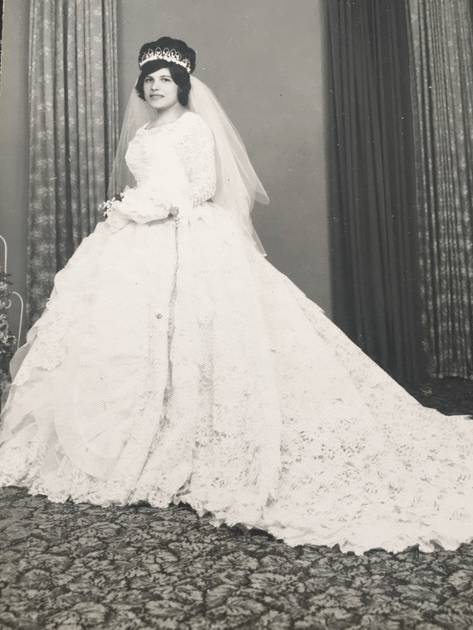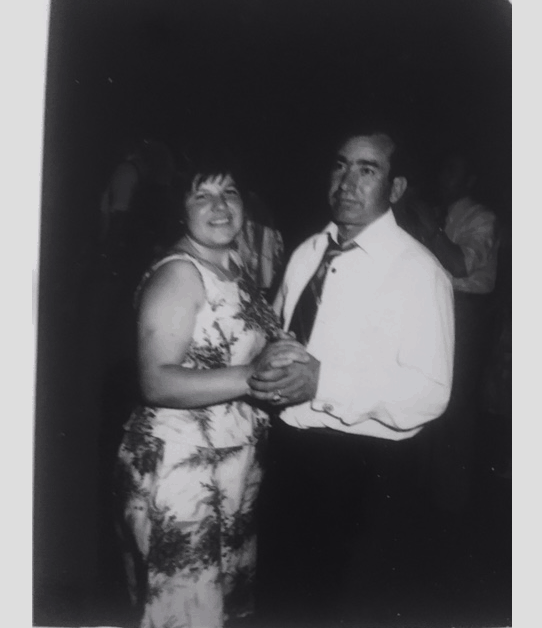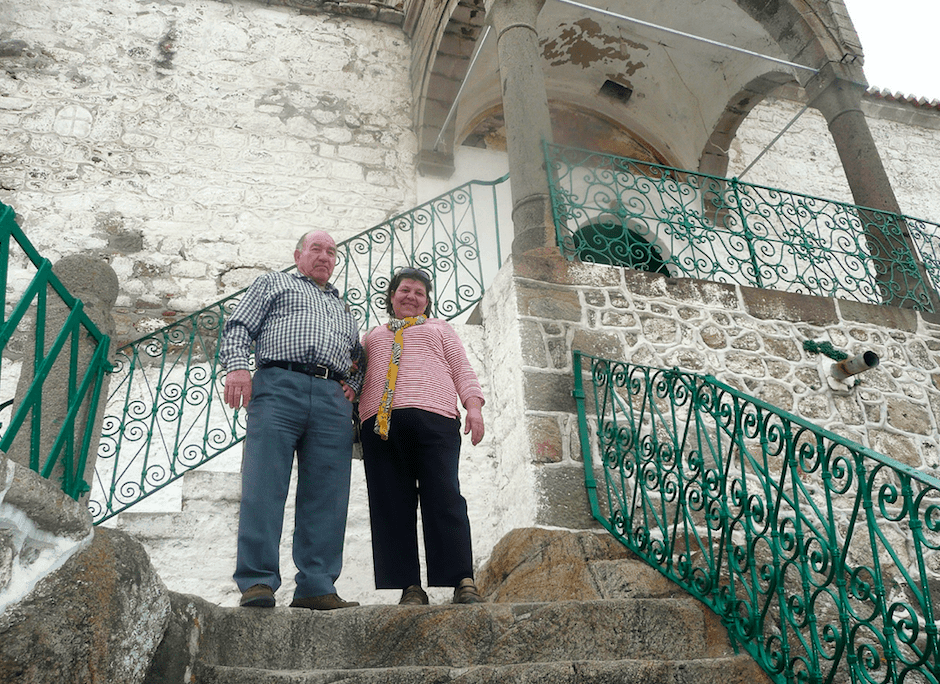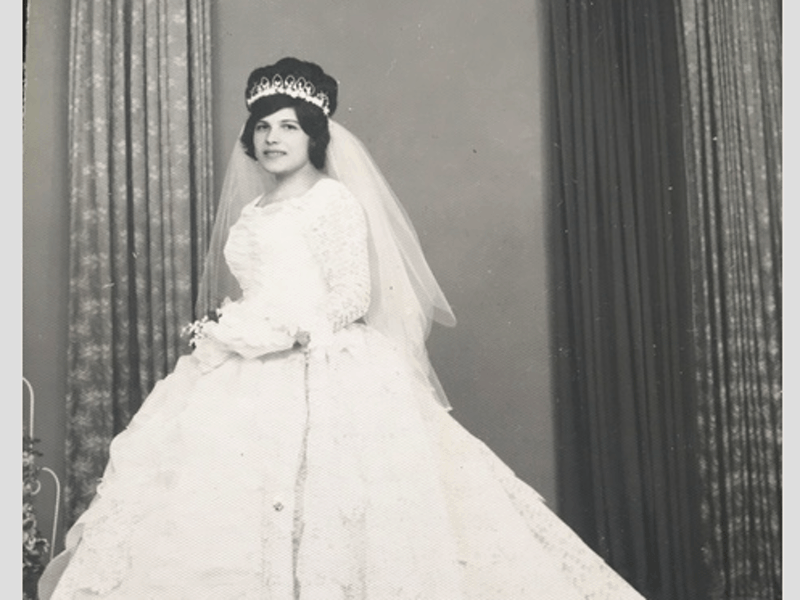
"I was born in 1947 on the island of Lesvos, in a village not far from the sea, atop a mountain.
My childhood was difficult. Imagine living in a tiny one bedroom home in a small village on an island after the Second World War and the Civil War. It was a tough era for most people. There was a shortage of food which was scarce in the 1950s. Was it a famine? It came close in many places. For our family, we lived in poverty, there was very little money.
My mother passed away when I was eight years old. Her heritage is from Smyrna, when it was a Hellenic majority city. It's probable she was actually born there around 1922, the year of the Asia Minor Catastrophe, when the forced Greek and Turkish population exchange took place.
My father had been instructed by the doctor that my mother would face severe health problems if she fell pregnant again. Unfortunately, this happened and she passed away a few months after giving birth to my baby brother Savvas. He too died a few months later.
As an eight year old, the concept of having a childhood soon vanished as I was taken out of school to tend to a family that consisted of five children and my father. I had to work in the fields, with no play time, or learning how to be a child. Life was about making a few drachmas, cooking for the family, baking bread and trying to fill the void in a family with no mother and small children.
My younger sister Georgia was sent to the island of Chios to live in an orphanage within a year of my mum passing away. When I became a teenager I would save some money so that Georgia could come and visit us. Georgia eventually moved to Athens but we remain close to this day. My little brother Stratis was adopted by another family in a neighbouring village. I have the image of a man taking him away on a horse, looking back at us. This is hard for any child. We cried for days. I met him again at the age of 20 years old. Our neighbours who knew him, introduced us one day. This was an emotional time.
My education was completed by attending night classes at the primary school. My teacher was Mr Fotis Karafilis, and he did his best to teach me. I was not allowed to go study at High School. Instead, I was constantly working on my father's fields, as well as tending to olives harvesting, looking after what remained of my family and going to church. Life was hard all through my teenage years. I walked everywhere to work.
When I was 21 years old my older brother decided we should migrate to Sydney. Like all those who migrated, it was a chance to get out of the lack of economic opportunities and a country that was under a dictatorship.
It was a 40 day journey by ship from Greece to Australia. There was a breakdown of the ship in Cape Town and for three days the passengers, including myself, had to sleep on the docks. From the poverty of an island to sleeping on the docks!

My first impression of Australia was that it was different. From a village of a few hundred people to a city of perhaps a million. Sydney was a city where if you could work hard, you could get on with life. Within a week, I had a job at Camperdown at a biscuit factory. Speaking no English meant you had to pay as much attention as you could and work long hours for possibly $50 a week. It's hard to remember the exact amount, though it was not much. There were no Unions or strong work, health and safety practises at the places I worked at. Looking back, it was hard to imagine how employees were treated compared to the conditions of today. Australia was still a nation that manufactured via suburban factories and did it well.
After doing factory work for a few years, I took up work in eateries, mainly in the kitchen environment. This is something I enjoy. I learnt many village recipes from my grandmother, perhaps Smyrna-style recipes, and it certainly influenced my outlook on cuisine and entertaining. My grandmother and also my mother were wonderful cooks. The pites (pies) people now associate me with making, I used to make for a shop we once had a long time ago. People enjoyed them and I loved making them. I love to bake, especially for our community or an event, proud to make the usual Lesvos food, octopus vinegar, Pastitsio, sweets and a few other delicacies.
Within six months of arriving in Australia, I was married to a man from Lesvos. This was an arranged marriage, something that was common back then among the migrants. Our honeymoon was in rural Orange, which somewhat felt closer to home.
By 1972 we were living in Canterbury and this was a hub for Hellenes and for people from Lesvos. The Mytilenean Brotherhood became a big element of my life over the decades. I had a baby, Sophie, and the neighbourhood was fantastic. The Australians would always remember when Sophie had a birthday and celebrated it. In many ways, it was like being in a village. My memories of Canterbury and the people, Hellenes and non-Hellenes, are wonderful. Our neighbourhood was a cul-de-sac and all of us were close. My son Billy, who was born in 1977 is still good friends with many of the younger generation of that era.
What I liked the most about Sydney was that it was a modern city with a good climate. My life was initially work and home. However, we met some amazing people who became lifelong friends. There was a real sense of community amongst the newly arrived. These people became my friends for life.
The most challenging part of living in Australia was not speaking the language. For a migrant woman in that era, it was always going to be tough. Eventually the language came, and with hard work, a husband and family, how much could anyone complain!
After we moved from Canterbury, there were many years where I had to contend with neighbours who were not well disposed toward ‘wogs’ as we had been called. It’s the type of racism that contrasts with some of the welcoming ways of other Australians. As time went on, all we could do is forgive them and accept that multiculturalism is moving forward in leaps and bounds. I would gladly share an Ouzo or meal with them today. In my life I heard the word "wogs" used many times. In the end, we have all moved past it.

What I missed most from Lesvos was my friends, the food, the sea, and home. When I was leaving for Australia, my friends and neighbours came together and sang a song of goodbye. “Stin Afstralia makria tha figoune, mana mou gluken na vroune parigrogia. Na akouson ta tragoudia mou oli xenitemeni. Tha figo mou gluke, ti ftuxeia den antexo alla pao na vrou ti teixi mou olli xinetemeni.”
This was a different era, no online friendships or Facebook. Human communication was real. It was truly beautiful.
In 1979 we returned to Lesvos for the first time since migrating, and stayed for almost six months. Our paradise remained a paradise. It was great to see new roads paved and the island developing. Businesses and trade had increased and the poverty I had moved from appeared to have gone; at least the poverty I had experienced. Greece was no longer under the Junta and more importantly, I was visiting as a tourist and enjoying the island as such. I came back for a few months in 1987, Billy, even attended school, my school. This was a special moment. The island was starting to flourish.
It was definitely important for me to teach my children and grandchildren the language and culture, and my daughter and grandkids have taken to the language. Sophie speaks it fluently, yet has not been since 1995. Billy goes to Greece every year, however, in keeping with his mischievous childhood, he skipped out of Greek school and the culture early. It is certainly ironic that he now lectures and writes about our culture and helps encourage the grandkids to learn the language and some of his girlfriends have been native Greek speakers. I love the fact that he made a film about Lesvos, it means a lot to all of us.
Billy initially declined to attend his graduation for his Master Degree but I forced him to be there. I cried when he picked up the “paper” as he described it. I told him, it was the greatest day of my life. And why? I never had the chance he had. It meant a lot to send our children to study. This is why we worked as hard as we did, like all of the migrants.
In my experience the strength of good people around you and a belief in God have been key factors in surviving hardship. We all have hardships, we all have a belief and it is important to know life has ups and downs and we will all eventually get over hurdles, no matter what they are.
I do feel like I have two patrides. My island of Lesvos and Sydney."
Maria Cotsis



Thank you very much Gina and Greek City Times. My mum is grateful that you shared her story. Should anyone wish to know more about our brilliant island, feel from to watch the documentary which features my mum too https://m.youtube.com/watch?v=39UARMLYIbY